

Science Suggests That Humans Are Not Innately Violent And Vicious. Psychological and biological theories of aggression and violence stem from a debate that continues to this day, whether these qualities are innate in humans or not.

These contrasting views are found throughout history in the writings of philosophers and scientific thinkers. Many subscribe to the Darwinian idea that violence is at the core of human life, that through competition and fighting to survive, only the fittest of species will move forward, evolve and survive. The purpose of this article is not to examine, dispute or confirm the theory of evolution, it’s to examine the claim that humans are innately vicious, competitive and violent, that these characteristics are burned into our genes. The McCollough Effect - An On-line Science Exhibit.
Shareable. 6 Awesome Board Games That Teach Cooperation. Commonopoly in action.
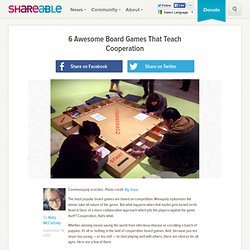
Photo credit: Big Hope. The most popular board games are based on competition. Monopoly epitomizes the winner take all nature of the genre. But what happens when that model gets turned on its head in favor of a more collaborative approach which pits the players against the game itself? Cooperation, that's what. Whether winning means saving the world from infectious disease or corralling a bunch of puppies, it's all or nothing in the land of cooperative board games. Commonopoly Object of Game: This oversized board game was inspired by the classic Monopoly, though not without a collaborative spin. Target Age: 12+ Number of Players: 2-4 Co-opoly. What Happens When A Black Man Brings His White Girlfriend Into A Harlem Barbershop? [Watch] Study shows empathy in rats. The limits of collaborative consumption: Would people really share their belongings? An unofficial Google news blog Google Operating System has reported that the search giant is playing around with a potential new service called “Google Mine” — a Google+ feature that would allow users to share their real-life possessions with their social network.
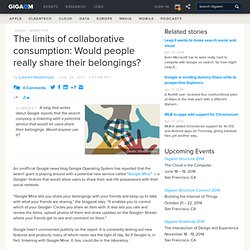
“Google Mine lets you share your belongings with your friends and keep up to date with what your friends are sharing,” the blogpost says. “It enables you to control which of your Google+ Circles you share an item with. It also lets you rate and review the items, upload photos of them and share updates on the Google+ Stream where your friends get to see and comment on them.” It's Heartbreaking To See How People React To The First Half Of His Test Compared To The Second.
Skills learning program in middle schools dramatically reduces fighting. Middle school children who completed a social-emotional skills learning program at school were 42 percent less likely to engage in physical fighting a year later, according to a new study in the Journal of Adolescent Health.

The study, which is ongoing, involves more than 3,600 children at 36 middle schools across Illinois and Kansas, the largest sample to date used to investigate the impact of a social-emotional skills learning program on the behavior of middle school students. How Money Makes People Act Less Human. In a windowless room on the University of California, Berkeley, campus, two undergrads are playing a Monopoly game that one of them has no chance of winning.
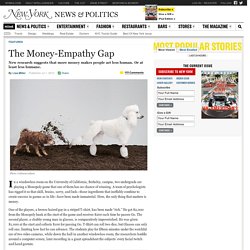
A team of psychologists has rigged it so that skill, brains, savvy, and luck—those ingredients that ineffably combine to create success in games as in life—have been made immaterial. She studies how poverty might change the brain. Martha Farah studies the connection between socioeconomic status and the brain at the University of Pennsylvania.
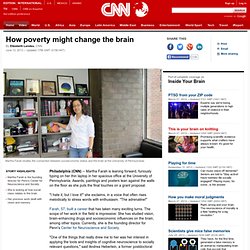
Martha Farah is the founding director for Penn's Center for Neuroscience and SocietyShe is looking at how social class relates to the brainHer previous work dealt with vision and memory Philadelphia (CNN) -- Martha Farah is leaning forward, furiously typing on her thin laptop in her spacious office at the University of Pennsylvania. Awards, paintings and posters lean against the walls on the floor as she puts the final touches on a grant proposal. "I hate it, but I love it! " she exclaims, in a voice that often rises melodically to stress words with enthusiasm. Farah, 57, built a career that has taken many exciting turns. They Finally Tested The 'Prisoner's Dilemma' On Actual Prisoners — And The Results Were Not What You Would Expect.
The “prisoner’s dilemma” is a familiar concept to just about anybody that took Econ 101.

The basic version goes like this. Sharing: Culture and the Economy in the Internet Age - By Philippe Aigrain. Paris, February 3rd, 2012 – Sharing: Culture and the Economy in the Internet Age is out!
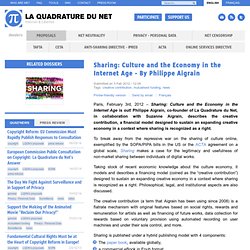
Philippe Aigrain, co-founder of La Quadrature du Net, in collaboration with Suzanne Aigrain, describes the creative contribution, a financial model designed to sustain an expanding creative economy in a context where sharing is recognized as a right. To break away from the repressive war on the sharing of culture online, exemplified by the SOPA/PIPA bills in the US or the ACTA agreement on a global scale, Sharing makes a case for the legitimacy and usefulness of non-market sharing between individuals of digital works.
Www.sharing-thebook.com. Why your 8-year-old should be coding. Learn-to-code startups abound these days, but one in particular is focusing on the very young and is having some success in elementary schools around the country — even underserved schools with no budgets for STEM but a great need for better tools.

The startup is Tynker; it makes a web-based learning platform and a visual programming language for teachers and kids in K-12 classrooms. In a discussion with its co-founder, we found out why teaching kids how to code is so important to him. Krishna Vedati came to the U.S. in 1991 as a grad student from India.
He got a master’s in computer science, then rode the dotcom wave at a handful of startups, including one he founded himself. After IPOs and acquisitions and the eventual bust, he found himself a decade older and wiser but still thinking about solving big-picture problems with technology — this time, a bit closer to home. “I have two kids, nine and six, a boy and a girl. To clarify, these kids learn the logic of coding. Survival of the Nicest? A new theory of our origins says cooperation-not competition-is instinctive.
Republished from yesmagazine.org By Eric Michael Johnson A century ago, industrialists like Andrew Carnegie believed that Darwin’s theories justified an economy of vicious competition and inequality.
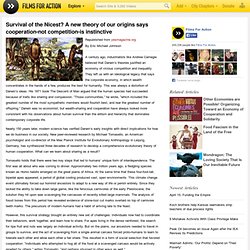
People Getting Dumber? Human Intelligence Has Declined Since Victorian Era, Research Suggests. Our technology may be getting smarter, but a provocative new study suggests human intelligence is on the decline. In fact, it indicates that Westerners have lost 14 I.Q. points on average since the Victorian Era. What exactly explains this decline? Study co-author Dr. Jan te Nijenhuis, professor of work and organizational psychology at the University of Amsterdam, points to the fact that women of high intelligence tend to have fewer children than do women of lower intelligence. The Gift Economy in Mali. New study suggests humans are not naturally violent.
J.G. VibesActivist Post A new study published last month in Nature Journalsuggests that humans are naturally good. This study adds to the mounting evidence against the popular misconception that corruption is a trait of human nature. In ten experiments using economic games, scientists observed that faster decisions result in more cooperation and generosity, while slower, calculated decisions show a decrease in cooperation and generosity.
Mesmerizing Photographs Of Soldiers' Faces Before And After A War. 2 Monkeys Were Paid Unequally; See What Happens Next. Department of Developmental and Comparative Psychology. 1. Warneken & Tomasello (2006) Science Warneken, F. & Tomasello, M. (2006). Altruistic helping in human infants and young chimpanzees. Science, 311, 1301-1303. a. B. Minority rules: Scientists discover tipping point for the spread of ideas. Scientists at Rensselaer Polytechnic Institute have found that when just 10 percent of the population holds an unshakable belief, their belief will always be adopted by the majority of the society. The scientists, who are members of the Social Cognitive Networks Academic Research Center (SCNARC) at Rensselaer, used computational and analytical methods to discover the tipping point where a minority belief becomes the majority opinion.
The finding has implications for the study and influence of societal interactions ranging from the spread of innovations to the movement of political ideals.